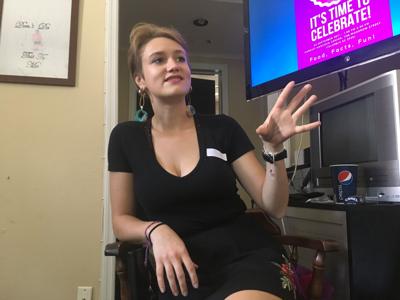
Miles Joyner sits before a crowd of about a dozen people in the living room of the Harriet Hancock Center and readies a laptop.
“So I’m just going to give a quick crash course as a ‘Yay, it’s our day’ kind of deal,” Joyner says.
Joyner is a bisexual activist in Columbia. Today, they’re giving a presentation as part of BiWeek, a yearly event meant to raise awareness about the bisexual community and the issues the community faces. Today is the culmination of the week — Bi Day of Visibility, or as some call it, Bi Coming Out Day.
When bisexuals come out, many times it’s written off as a phase, Joyner says.
“When I first came out I heard, ‘Oh, but you still have a boyfriend,’” Joyner recalls. “I was like ‘Yeah, but this still stands. What I just said still counts.’ A lot of times it goes like that.
Having one’s sexual identity disregarded lingers long after coming out, in Joyner’s experience. Misunderstandings of bisexuality pervade the straight as well as the gay community. The problems stem from the fact that many people don’t understand how to define bisexuality. The sexual orientation goes beyond an attraction to men and women, in Joyner’s definition.
“My personal [definition] is an attraction to more than one gender,” Joyner says. “That can be varying degrees to varying kinds. It’s all fluid.
“We’re kind of in this gray area within the LGBT (lesbian, gay, bisexual, transgender) and QIA (questioning/queer, intersex, asexual) community and the straight community. A lot of straight individuals reject us for our same-gender attractions and a lot of gay and lesbian individuals reject us for our different-gender attractions.”
The bi community is overlooked in many ways, according to Joyner. One way bisexuals are excluded is in language.
“People say ‘gay marriage’ rather than ‘same-gender marriage,’” Joyner says. “When a bisexual person marries someone of their same gender that doesn’t automatically make them a gay or lesbian individual. They’re still bi.”
LGBTQ support spaces often don’t make room for bisexual people, in Joyner’s assessment, “due to this figurative fine print.”
“There’s not many resources for us in Columbia,” Joyner says. “There’s actually only one in Columbia specifically for bisexuals and that’s a support group.
One of the most crucial elements where the bisexual community finds itself left out is in the amount of money it receives.
“We’re kind of given the finger as far as money and grants go,” Joyner says.
In 2015, around $33 million in grants were given to LGBTQ groups, according to the organization Funders for LGBTQ Issues. Only about $485,000 went to bisexual groups while gay and lesbian interests got $13.8 million combined.
Jeff Ayers, executive director of SC Equality, believes the bisexual community is indeed left out of funding due to the recent focus on marriage equality and transgender bathroom rights. But ignoring the bisexual community reaches further than money.
“We face discrimination from outside our community, but we face it within our own community,” Ayers says. “We have a lot of work to do on education on the bisexual community. It’s a topic that’s been left in the shadows. … It’s pretty sad when you say we’re the LGBT community but you hear the focus on the L G and T. We need to do more to support them. We’re in this thing together.”
It doesn’t always feel like they’re in it together, in Joyner’s view.
“The outcasting has become such a problem that there’s actually pejorative terms just for bisexuals like ‘hasbian’ and ‘yestergay,’” Joyner says. “A lot of young bisexuals specifically they don’t feel they’re deserving to go to Pride parades and festivals. They’re like, ‘I’m not queer enough. What if I’m dating a man and I appear to be a woman and people think I’m just an ally?’ Because of that we tend to exclude ourselves while also being shunned away.”
Joyner’s even dealt with biphobia. Four years ago, they were in a gay club during a drag show. The performer was singing “If You’re Happy and You Know it,” and asked anybody who was bi to clap their hands. Joyner was the only person to do it.
“She came up to me and said a variety of things in the tune of the song, but the one that stuck out the most was, ‘Just pick a side,’” Joyner remembers. “That’s a common thing with a lot of gay communities across the country. … There’s always that kind of second where you’re just debating within yourself whether it’s worth confronting. That’s common with any sort of incident like that regardless of your orientation. In that particular event I just went with it and dealt with it because you never know what the crowd’s going to be like.”
To try to combat these misunderstandings and the overlooking of the bi community, Joyner hosts a Bi 101 class at various locations around the Midlands where they talk about the history of bisexuality, terminology in current discourse, and stats about bi-health and representation. While the course is for anybody, most of those who attend are bisexual and never knew there was a community for their sexual orientation in Columbia.
“There’s a lot of solemn surprise depending on what topics I’m covering,” Joyner says. “A lot of presentation I try to keep light hearted. But whenever it’s time for me to start talking about stats regarding bisexual women and intimate partner violence or bisexual mental health or even bi youth and rates of suicide and suicidal ideation there tends to be a solemn ‘oh wow.’







